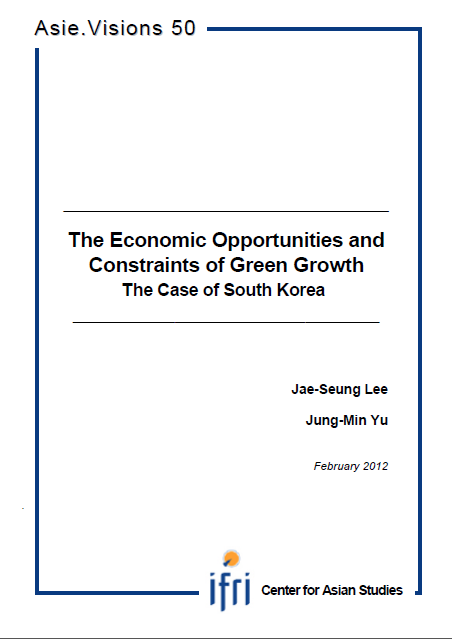The Economic Opportunities and Constraints of Green Growth: The Case of South Korea

To this end, 15 green technologies were chosen as priorities for governmental support. A number of green growth policies, such as the emission trading system, the Green Homes Project and the Renewable Portfolio Standard, are expected to provide a stable framework for domestic market expansion. In addition, the government R&D investment plan is expected to play an important role in filling a technological gap between South Korea and leading countries in green energy.
The nation's well-developed industrial foundation in areas such as technology and infrastructure will be an advantage that can be easily applied to the green energy industry. Furthermore, the nation's advanced IT and electronic technology firms have entered the smart-grid business.
Based on strong political support and policy measures, South Korea's green growth policy has showed noticeable progress in a short period of time. However, the biggest challenges are technological dependency and growing competition in the global market. Also, the transition from a hydrocarbon-based economy to a renewable-based one could bear a huge economic and social cost. The speed of the transition, as well as a series of external variables - such as the global economic condition - will also affect the progress of green growth in South Korea.

Available in:
Regions and themes
ISBN / ISSN
Share
Download the full analysis
This page contains only a summary of our work. If you would like to have access to all the information from our research on the subject, you can download the full version in PDF format.
The Economic Opportunities and Constraints of Green Growth: The Case of South Korea
Related centers and programs
Discover our other research centers and programsFind out more
Discover all our analysesEuropean Union-India: Lasting Rapprochement or Partnership of Convenience?
The partnership between the European Union (EU) and India has long been limited to economic exchanges. Its political dimension has gradually developed, culminating in its elevation to the status of a “strategic partnership” in 2004. However, the failure of negotiations for a free-trade agreement in 2013 slowed this momentum. Since the early 2020s, in an uncertain geopolitical context, bilateral rapprochement has gained new momentum.
Japan’s Takaichi Landslide: A New Face of Power
Prime Minister Sanae Takaichi has turned her exceptional popularity into a historic political victory. The snap elections of February 8 delivered an overwhelming majority for the Liberal Democratic Party (LDP), driven by strong support from young voters, drawn to her iconoclastic and dynamic image, and from conservative voters reassured by her vision of national assertiveness. This popularity lays the foundation for an ambitious strategy on both the domestic and international fronts.
The U.S. Policy Toward Taiwan Beyond Donald Trump: Mapping the American Stakeholders of U.S.-Taiwan Relations
Donald Trump’s return to the White House reintroduced acute uncertainty into the security commitment of the United States (U.S.) to Taiwan. Unlike President Joe Biden, who repeatedly stated the determination to defend Taiwan, President Trump refrains from commenting on the hypothetical U.S. response in the context of a cross-Strait crisis.

China’s Strategy Toward Pacific Island countries: Countering Taiwan and Western Influence
Over the past decade, China has deployed a diplomatic strategy toward the Pacific Island Countries (PICs). This strategy pursues two main objectives: countering Taiwan's diplomatic influence in the region and countering the influence of liberal democracies in what Beijing refers to as the "Global South."









